Research Proposal: Cultural Differences in Parental Involvement
VerifiedAdded on 2023/06/15
|19
|4364
|76
Report
AI Summary
This research proposal investigates the influence of parents from diverse cultural backgrounds on their children's educational and social development, focusing on the UK, USA, and South Africa. It reviews existing literature and theoretical frameworks, examining parenting styles and their impact on children's choices regarding out-of-school activities like maths, science, dance, and football. The proposal outlines the research approach, including data collection techniques, research methods, and ethical considerations. It anticipates potential results, aiming to understand how cultural differences shape parental decisions and subsequently affect children's development. This proposal utilizes theories from Vygotsky, Bourdieu, Epstein and Coleman to frame the research and analysis.
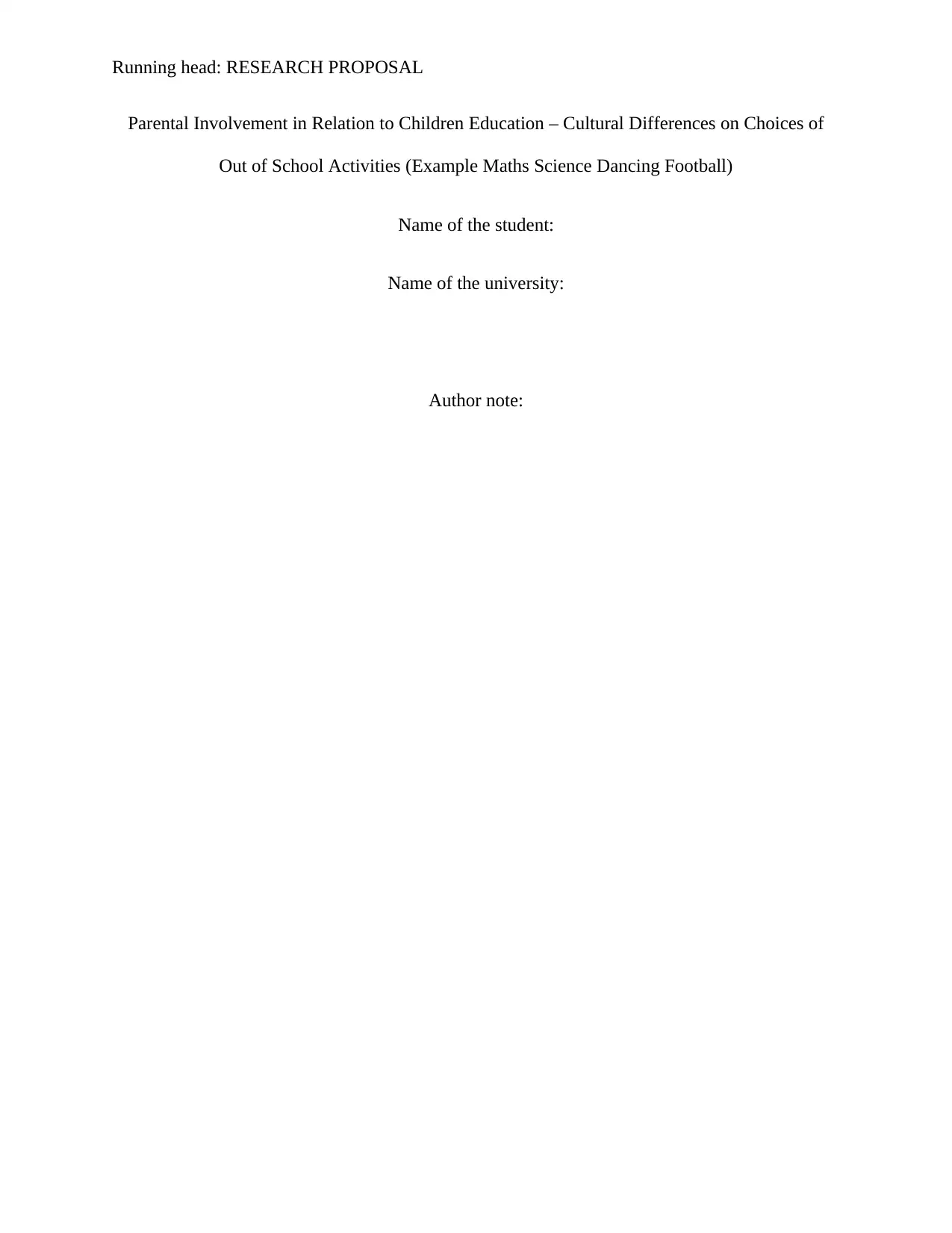
Running head: RESEARCH PROPOSAL
Parental Involvement in Relation to Children Education – Cultural Differences on Choices of
Out of School Activities (Example Maths Science Dancing Football)
Name of the student:
Name of the university:
Author note:
Parental Involvement in Relation to Children Education – Cultural Differences on Choices of
Out of School Activities (Example Maths Science Dancing Football)
Name of the student:
Name of the university:
Author note:
Paraphrase This Document
Need a fresh take? Get an instant paraphrase of this document with our AI Paraphraser
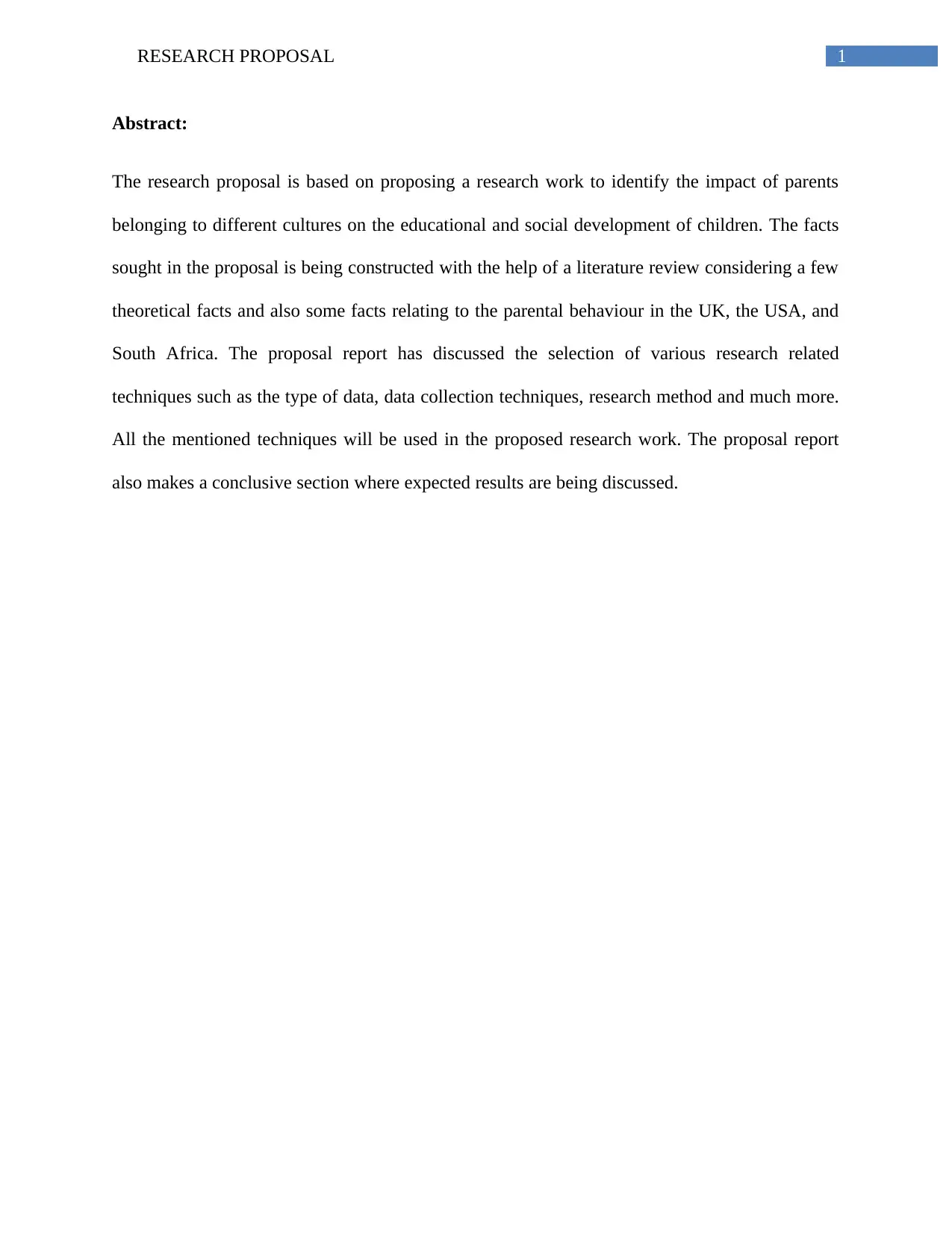
1RESEARCH PROPOSAL
Abstract:
The research proposal is based on proposing a research work to identify the impact of parents
belonging to different cultures on the educational and social development of children. The facts
sought in the proposal is being constructed with the help of a literature review considering a few
theoretical facts and also some facts relating to the parental behaviour in the UK, the USA, and
South Africa. The proposal report has discussed the selection of various research related
techniques such as the type of data, data collection techniques, research method and much more.
All the mentioned techniques will be used in the proposed research work. The proposal report
also makes a conclusive section where expected results are being discussed.
Abstract:
The research proposal is based on proposing a research work to identify the impact of parents
belonging to different cultures on the educational and social development of children. The facts
sought in the proposal is being constructed with the help of a literature review considering a few
theoretical facts and also some facts relating to the parental behaviour in the UK, the USA, and
South Africa. The proposal report has discussed the selection of various research related
techniques such as the type of data, data collection techniques, research method and much more.
All the mentioned techniques will be used in the proposed research work. The proposal report
also makes a conclusive section where expected results are being discussed.
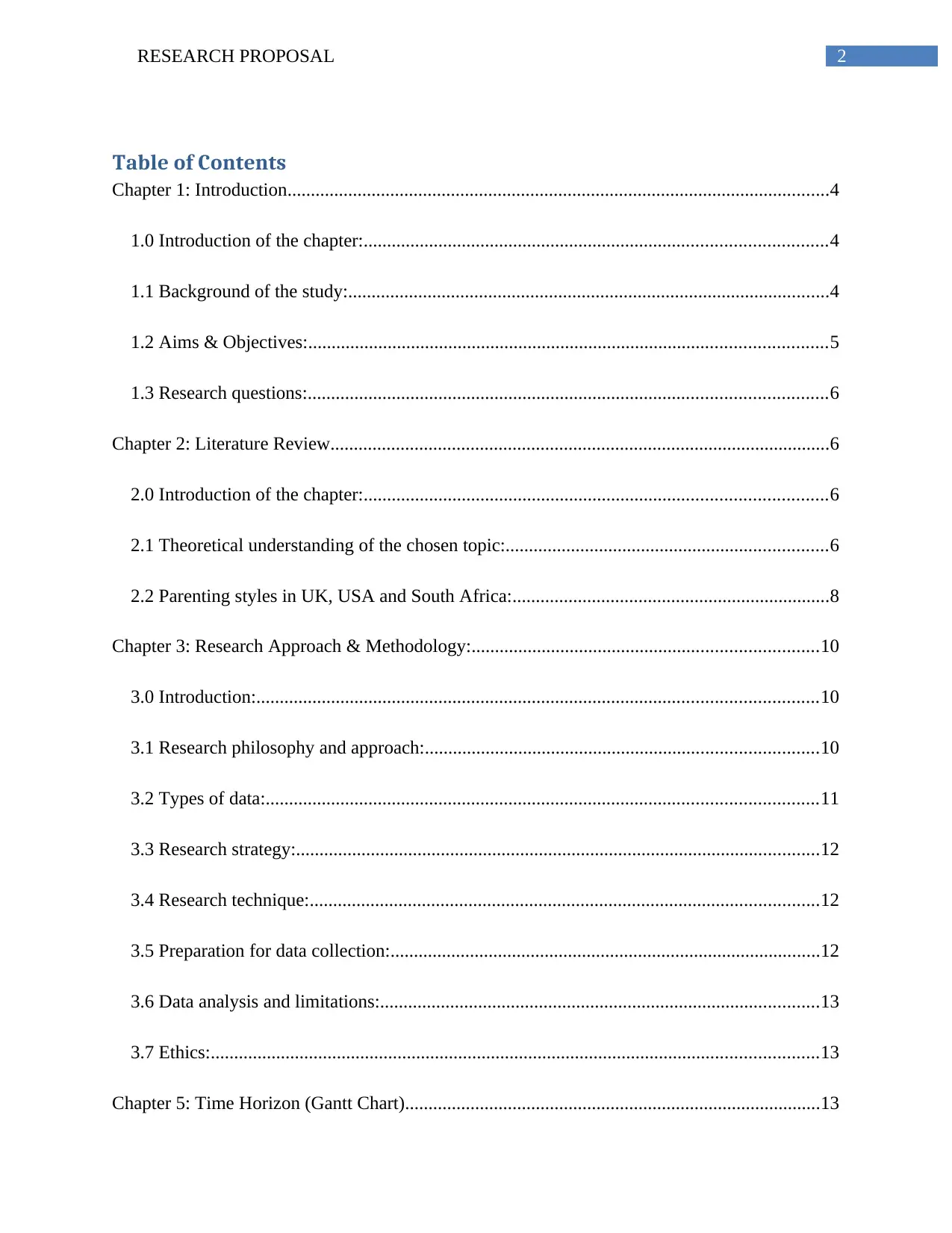
2RESEARCH PROPOSAL
Table of Contents
Chapter 1: Introduction....................................................................................................................4
1.0 Introduction of the chapter:...................................................................................................4
1.1 Background of the study:.......................................................................................................4
1.2 Aims & Objectives:...............................................................................................................5
1.3 Research questions:...............................................................................................................6
Chapter 2: Literature Review...........................................................................................................6
2.0 Introduction of the chapter:...................................................................................................6
2.1 Theoretical understanding of the chosen topic:.....................................................................6
2.2 Parenting styles in UK, USA and South Africa:....................................................................8
Chapter 3: Research Approach & Methodology:..........................................................................10
3.0 Introduction:........................................................................................................................10
3.1 Research philosophy and approach:....................................................................................10
3.2 Types of data:......................................................................................................................11
3.3 Research strategy:................................................................................................................12
3.4 Research technique:.............................................................................................................12
3.5 Preparation for data collection:............................................................................................12
3.6 Data analysis and limitations:..............................................................................................13
3.7 Ethics:..................................................................................................................................13
Chapter 5: Time Horizon (Gantt Chart).........................................................................................13
Table of Contents
Chapter 1: Introduction....................................................................................................................4
1.0 Introduction of the chapter:...................................................................................................4
1.1 Background of the study:.......................................................................................................4
1.2 Aims & Objectives:...............................................................................................................5
1.3 Research questions:...............................................................................................................6
Chapter 2: Literature Review...........................................................................................................6
2.0 Introduction of the chapter:...................................................................................................6
2.1 Theoretical understanding of the chosen topic:.....................................................................6
2.2 Parenting styles in UK, USA and South Africa:....................................................................8
Chapter 3: Research Approach & Methodology:..........................................................................10
3.0 Introduction:........................................................................................................................10
3.1 Research philosophy and approach:....................................................................................10
3.2 Types of data:......................................................................................................................11
3.3 Research strategy:................................................................................................................12
3.4 Research technique:.............................................................................................................12
3.5 Preparation for data collection:............................................................................................12
3.6 Data analysis and limitations:..............................................................................................13
3.7 Ethics:..................................................................................................................................13
Chapter 5: Time Horizon (Gantt Chart).........................................................................................13
⊘ This is a preview!⊘
Do you want full access?
Subscribe today to unlock all pages.

Trusted by 1+ million students worldwide

3RESEARCH PROPOSAL
Conclusion:....................................................................................................................................14
References:....................................................................................................................................16
Conclusion:....................................................................................................................................14
References:....................................................................................................................................16
Paraphrase This Document
Need a fresh take? Get an instant paraphrase of this document with our AI Paraphraser
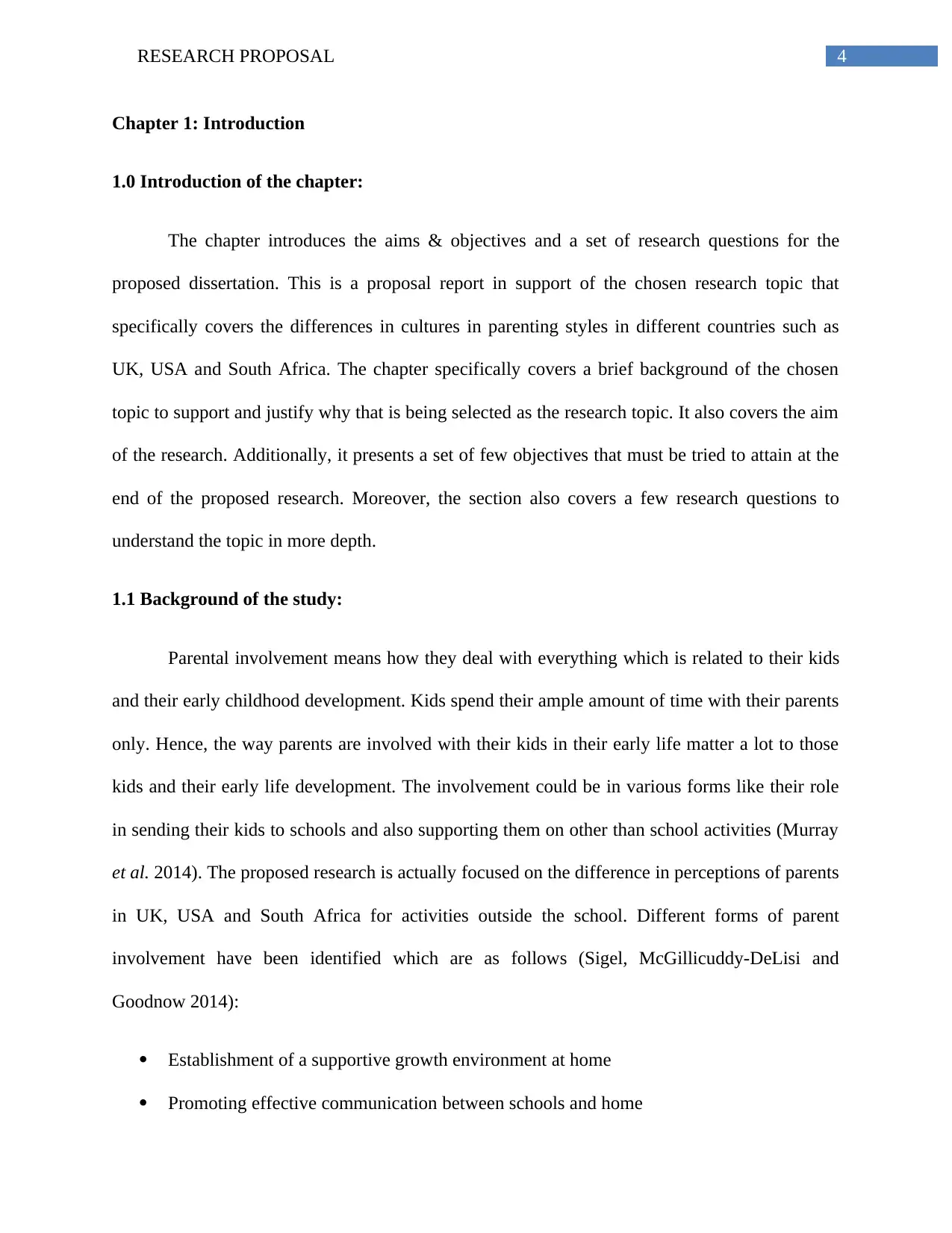
4RESEARCH PROPOSAL
Chapter 1: Introduction
1.0 Introduction of the chapter:
The chapter introduces the aims & objectives and a set of research questions for the
proposed dissertation. This is a proposal report in support of the chosen research topic that
specifically covers the differences in cultures in parenting styles in different countries such as
UK, USA and South Africa. The chapter specifically covers a brief background of the chosen
topic to support and justify why that is being selected as the research topic. It also covers the aim
of the research. Additionally, it presents a set of few objectives that must be tried to attain at the
end of the proposed research. Moreover, the section also covers a few research questions to
understand the topic in more depth.
1.1 Background of the study:
Parental involvement means how they deal with everything which is related to their kids
and their early childhood development. Kids spend their ample amount of time with their parents
only. Hence, the way parents are involved with their kids in their early life matter a lot to those
kids and their early life development. The involvement could be in various forms like their role
in sending their kids to schools and also supporting them on other than school activities (Murray
et al. 2014). The proposed research is actually focused on the difference in perceptions of parents
in UK, USA and South Africa for activities outside the school. Different forms of parent
involvement have been identified which are as follows (Sigel, McGillicuddy-DeLisi and
Goodnow 2014):
Establishment of a supportive growth environment at home
Promoting effective communication between schools and home
Chapter 1: Introduction
1.0 Introduction of the chapter:
The chapter introduces the aims & objectives and a set of research questions for the
proposed dissertation. This is a proposal report in support of the chosen research topic that
specifically covers the differences in cultures in parenting styles in different countries such as
UK, USA and South Africa. The chapter specifically covers a brief background of the chosen
topic to support and justify why that is being selected as the research topic. It also covers the aim
of the research. Additionally, it presents a set of few objectives that must be tried to attain at the
end of the proposed research. Moreover, the section also covers a few research questions to
understand the topic in more depth.
1.1 Background of the study:
Parental involvement means how they deal with everything which is related to their kids
and their early childhood development. Kids spend their ample amount of time with their parents
only. Hence, the way parents are involved with their kids in their early life matter a lot to those
kids and their early life development. The involvement could be in various forms like their role
in sending their kids to schools and also supporting them on other than school activities (Murray
et al. 2014). The proposed research is actually focused on the difference in perceptions of parents
in UK, USA and South Africa for activities outside the school. Different forms of parent
involvement have been identified which are as follows (Sigel, McGillicuddy-DeLisi and
Goodnow 2014):
Establishment of a supportive growth environment at home
Promoting effective communication between schools and home

5RESEARCH PROPOSAL
Supporting students in their school activities and also on out of the school activities
Working with other stakeholders like community, students, school staff etc.
Learning environment at home
Basically, parent involvement activities can be divided into two categories like home-based and
school-based parent involvements. Notably, positive attitudes of parents in both school and other
than school activities may foster a positive development of kids. A positive development is
indeed necessary at their early ages as an unsupportive home based environment may certainly
hamper their actual progress. A positive progress from the very start of the age is indeed
important for a healthy professional career ahead. Such kids are more certain to have a positive
frame of mind which is a valuable quality and also helpful in different challenging situations at
the different stages of life (Domènech Rodriguez, Donovick and Crowley 2009).
1.2 Aims & Objectives:
Aims:
To analyse the level of contribution of parents in selecting options for their school
activities
Objectives:
To test the different aspects that the different cultures carry in regards to making
selection on extra-school activities
To know the factors which parents consider while making choices on such extra
activities
To evaluate the reasons which parents give for their selections
Supporting students in their school activities and also on out of the school activities
Working with other stakeholders like community, students, school staff etc.
Learning environment at home
Basically, parent involvement activities can be divided into two categories like home-based and
school-based parent involvements. Notably, positive attitudes of parents in both school and other
than school activities may foster a positive development of kids. A positive development is
indeed necessary at their early ages as an unsupportive home based environment may certainly
hamper their actual progress. A positive progress from the very start of the age is indeed
important for a healthy professional career ahead. Such kids are more certain to have a positive
frame of mind which is a valuable quality and also helpful in different challenging situations at
the different stages of life (Domènech Rodriguez, Donovick and Crowley 2009).
1.2 Aims & Objectives:
Aims:
To analyse the level of contribution of parents in selecting options for their school
activities
Objectives:
To test the different aspects that the different cultures carry in regards to making
selection on extra-school activities
To know the factors which parents consider while making choices on such extra
activities
To evaluate the reasons which parents give for their selections
⊘ This is a preview!⊘
Do you want full access?
Subscribe today to unlock all pages.

Trusted by 1+ million students worldwide
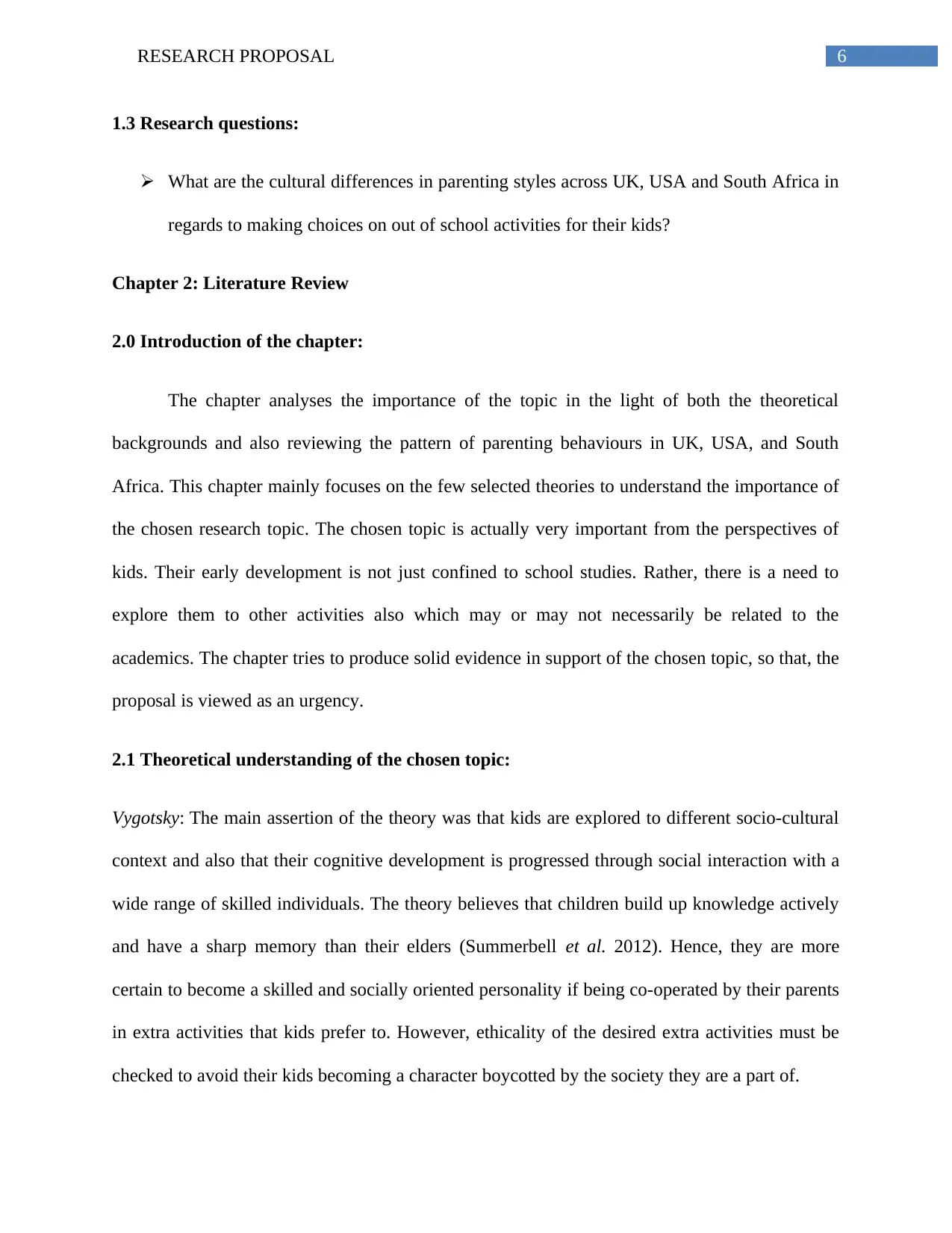
6RESEARCH PROPOSAL
1.3 Research questions:
What are the cultural differences in parenting styles across UK, USA and South Africa in
regards to making choices on out of school activities for their kids?
Chapter 2: Literature Review
2.0 Introduction of the chapter:
The chapter analyses the importance of the topic in the light of both the theoretical
backgrounds and also reviewing the pattern of parenting behaviours in UK, USA, and South
Africa. This chapter mainly focuses on the few selected theories to understand the importance of
the chosen research topic. The chosen topic is actually very important from the perspectives of
kids. Their early development is not just confined to school studies. Rather, there is a need to
explore them to other activities also which may or may not necessarily be related to the
academics. The chapter tries to produce solid evidence in support of the chosen topic, so that, the
proposal is viewed as an urgency.
2.1 Theoretical understanding of the chosen topic:
Vygotsky: The main assertion of the theory was that kids are explored to different socio-cultural
context and also that their cognitive development is progressed through social interaction with a
wide range of skilled individuals. The theory believes that children build up knowledge actively
and have a sharp memory than their elders (Summerbell et al. 2012). Hence, they are more
certain to become a skilled and socially oriented personality if being co-operated by their parents
in extra activities that kids prefer to. However, ethicality of the desired extra activities must be
checked to avoid their kids becoming a character boycotted by the society they are a part of.
1.3 Research questions:
What are the cultural differences in parenting styles across UK, USA and South Africa in
regards to making choices on out of school activities for their kids?
Chapter 2: Literature Review
2.0 Introduction of the chapter:
The chapter analyses the importance of the topic in the light of both the theoretical
backgrounds and also reviewing the pattern of parenting behaviours in UK, USA, and South
Africa. This chapter mainly focuses on the few selected theories to understand the importance of
the chosen research topic. The chosen topic is actually very important from the perspectives of
kids. Their early development is not just confined to school studies. Rather, there is a need to
explore them to other activities also which may or may not necessarily be related to the
academics. The chapter tries to produce solid evidence in support of the chosen topic, so that, the
proposal is viewed as an urgency.
2.1 Theoretical understanding of the chosen topic:
Vygotsky: The main assertion of the theory was that kids are explored to different socio-cultural
context and also that their cognitive development is progressed through social interaction with a
wide range of skilled individuals. The theory believes that children build up knowledge actively
and have a sharp memory than their elders (Summerbell et al. 2012). Hence, they are more
certain to become a skilled and socially oriented personality if being co-operated by their parents
in extra activities that kids prefer to. However, ethicality of the desired extra activities must be
checked to avoid their kids becoming a character boycotted by the society they are a part of.
Paraphrase This Document
Need a fresh take? Get an instant paraphrase of this document with our AI Paraphraser
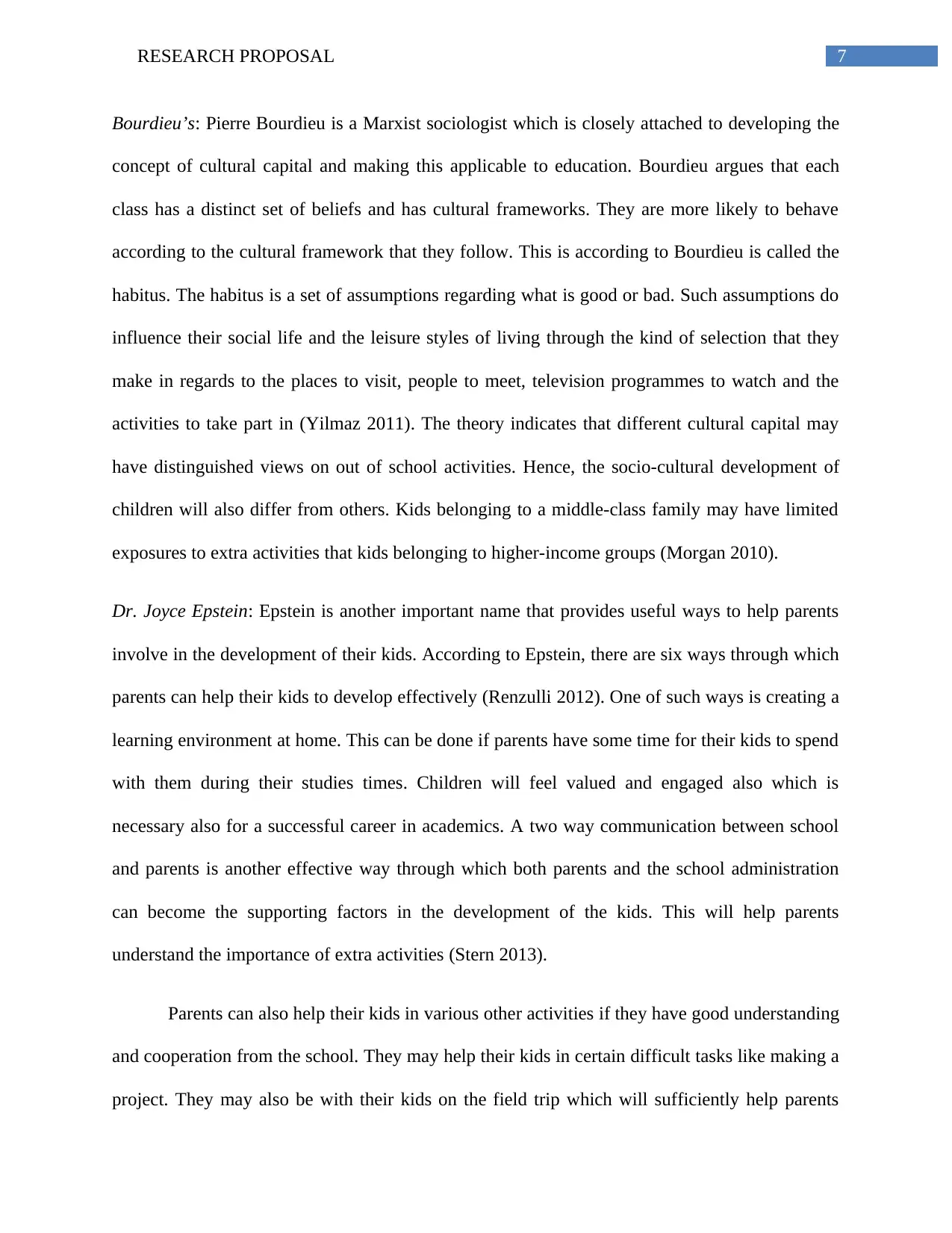
7RESEARCH PROPOSAL
Bourdieu’s: Pierre Bourdieu is a Marxist sociologist which is closely attached to developing the
concept of cultural capital and making this applicable to education. Bourdieu argues that each
class has a distinct set of beliefs and has cultural frameworks. They are more likely to behave
according to the cultural framework that they follow. This is according to Bourdieu is called the
habitus. The habitus is a set of assumptions regarding what is good or bad. Such assumptions do
influence their social life and the leisure styles of living through the kind of selection that they
make in regards to the places to visit, people to meet, television programmes to watch and the
activities to take part in (Yilmaz 2011). The theory indicates that different cultural capital may
have distinguished views on out of school activities. Hence, the socio-cultural development of
children will also differ from others. Kids belonging to a middle-class family may have limited
exposures to extra activities that kids belonging to higher-income groups (Morgan 2010).
Dr. Joyce Epstein: Epstein is another important name that provides useful ways to help parents
involve in the development of their kids. According to Epstein, there are six ways through which
parents can help their kids to develop effectively (Renzulli 2012). One of such ways is creating a
learning environment at home. This can be done if parents have some time for their kids to spend
with them during their studies times. Children will feel valued and engaged also which is
necessary also for a successful career in academics. A two way communication between school
and parents is another effective way through which both parents and the school administration
can become the supporting factors in the development of the kids. This will help parents
understand the importance of extra activities (Stern 2013).
Parents can also help their kids in various other activities if they have good understanding
and cooperation from the school. They may help their kids in certain difficult tasks like making a
project. They may also be with their kids on the field trip which will sufficiently help parents
Bourdieu’s: Pierre Bourdieu is a Marxist sociologist which is closely attached to developing the
concept of cultural capital and making this applicable to education. Bourdieu argues that each
class has a distinct set of beliefs and has cultural frameworks. They are more likely to behave
according to the cultural framework that they follow. This is according to Bourdieu is called the
habitus. The habitus is a set of assumptions regarding what is good or bad. Such assumptions do
influence their social life and the leisure styles of living through the kind of selection that they
make in regards to the places to visit, people to meet, television programmes to watch and the
activities to take part in (Yilmaz 2011). The theory indicates that different cultural capital may
have distinguished views on out of school activities. Hence, the socio-cultural development of
children will also differ from others. Kids belonging to a middle-class family may have limited
exposures to extra activities that kids belonging to higher-income groups (Morgan 2010).
Dr. Joyce Epstein: Epstein is another important name that provides useful ways to help parents
involve in the development of their kids. According to Epstein, there are six ways through which
parents can help their kids to develop effectively (Renzulli 2012). One of such ways is creating a
learning environment at home. This can be done if parents have some time for their kids to spend
with them during their studies times. Children will feel valued and engaged also which is
necessary also for a successful career in academics. A two way communication between school
and parents is another effective way through which both parents and the school administration
can become the supporting factors in the development of the kids. This will help parents
understand the importance of extra activities (Stern 2013).
Parents can also help their kids in various other activities if they have good understanding
and cooperation from the school. They may help their kids in certain difficult tasks like making a
project. They may also be with their kids on the field trip which will sufficiently help parents
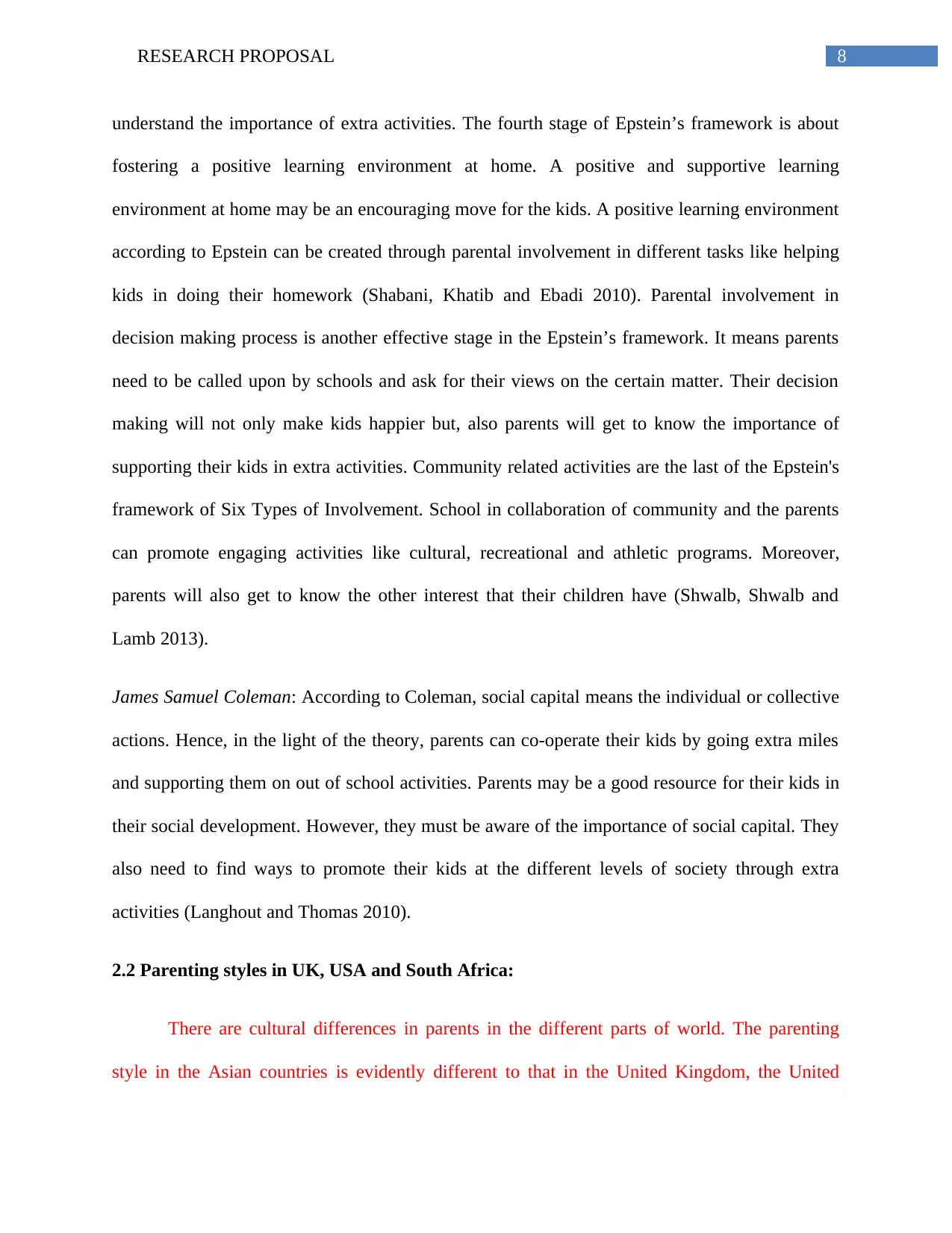
8RESEARCH PROPOSAL
understand the importance of extra activities. The fourth stage of Epstein’s framework is about
fostering a positive learning environment at home. A positive and supportive learning
environment at home may be an encouraging move for the kids. A positive learning environment
according to Epstein can be created through parental involvement in different tasks like helping
kids in doing their homework (Shabani, Khatib and Ebadi 2010). Parental involvement in
decision making process is another effective stage in the Epstein’s framework. It means parents
need to be called upon by schools and ask for their views on the certain matter. Their decision
making will not only make kids happier but, also parents will get to know the importance of
supporting their kids in extra activities. Community related activities are the last of the Epstein's
framework of Six Types of Involvement. School in collaboration of community and the parents
can promote engaging activities like cultural, recreational and athletic programs. Moreover,
parents will also get to know the other interest that their children have (Shwalb, Shwalb and
Lamb 2013).
James Samuel Coleman: According to Coleman, social capital means the individual or collective
actions. Hence, in the light of the theory, parents can co-operate their kids by going extra miles
and supporting them on out of school activities. Parents may be a good resource for their kids in
their social development. However, they must be aware of the importance of social capital. They
also need to find ways to promote their kids at the different levels of society through extra
activities (Langhout and Thomas 2010).
2.2 Parenting styles in UK, USA and South Africa:
There are cultural differences in parents in the different parts of world. The parenting
style in the Asian countries is evidently different to that in the United Kingdom, the United
understand the importance of extra activities. The fourth stage of Epstein’s framework is about
fostering a positive learning environment at home. A positive and supportive learning
environment at home may be an encouraging move for the kids. A positive learning environment
according to Epstein can be created through parental involvement in different tasks like helping
kids in doing their homework (Shabani, Khatib and Ebadi 2010). Parental involvement in
decision making process is another effective stage in the Epstein’s framework. It means parents
need to be called upon by schools and ask for their views on the certain matter. Their decision
making will not only make kids happier but, also parents will get to know the importance of
supporting their kids in extra activities. Community related activities are the last of the Epstein's
framework of Six Types of Involvement. School in collaboration of community and the parents
can promote engaging activities like cultural, recreational and athletic programs. Moreover,
parents will also get to know the other interest that their children have (Shwalb, Shwalb and
Lamb 2013).
James Samuel Coleman: According to Coleman, social capital means the individual or collective
actions. Hence, in the light of the theory, parents can co-operate their kids by going extra miles
and supporting them on out of school activities. Parents may be a good resource for their kids in
their social development. However, they must be aware of the importance of social capital. They
also need to find ways to promote their kids at the different levels of society through extra
activities (Langhout and Thomas 2010).
2.2 Parenting styles in UK, USA and South Africa:
There are cultural differences in parents in the different parts of world. The parenting
style in the Asian countries is evidently different to that in the United Kingdom, the United
⊘ This is a preview!⊘
Do you want full access?
Subscribe today to unlock all pages.

Trusted by 1+ million students worldwide
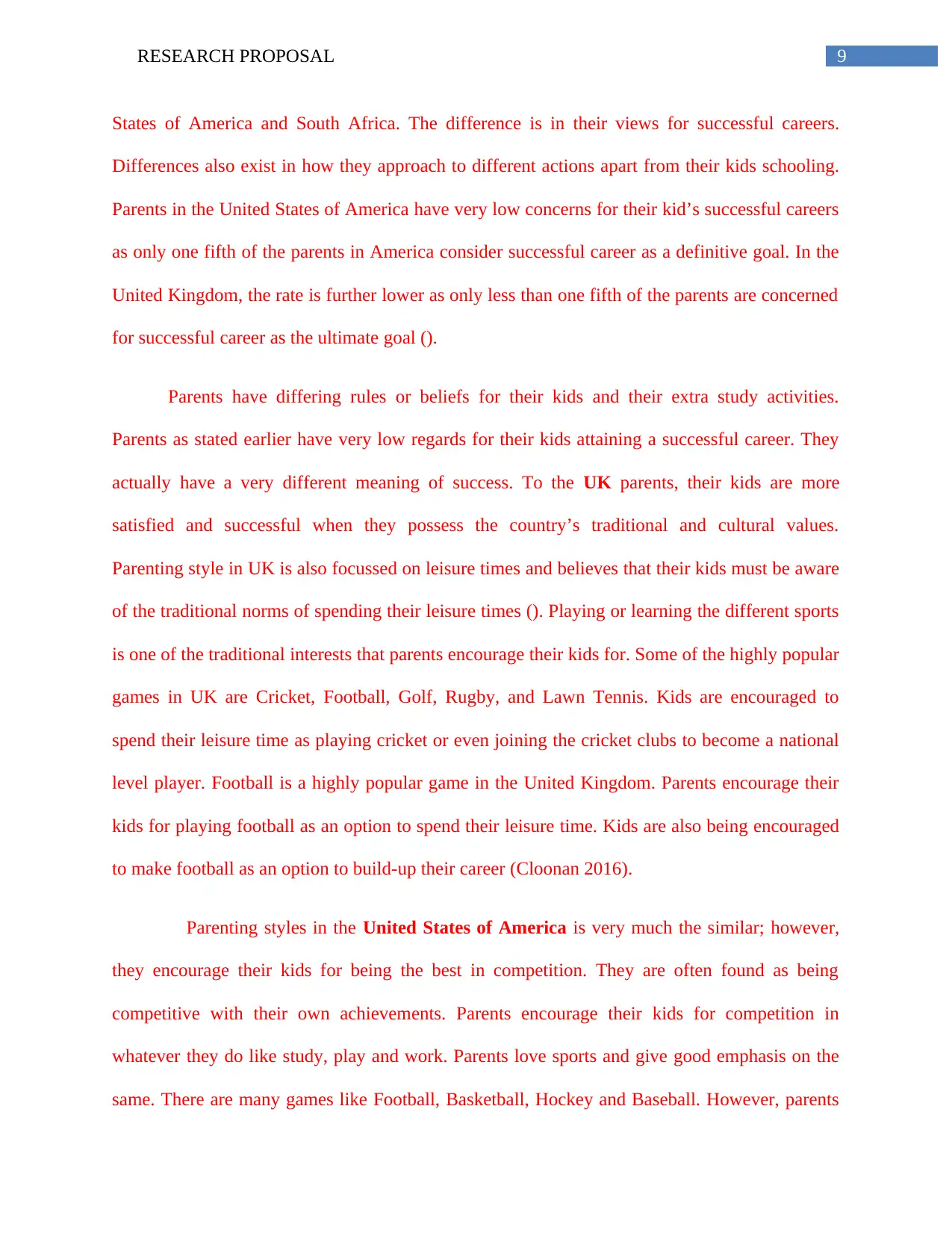
9RESEARCH PROPOSAL
States of America and South Africa. The difference is in their views for successful careers.
Differences also exist in how they approach to different actions apart from their kids schooling.
Parents in the United States of America have very low concerns for their kid’s successful careers
as only one fifth of the parents in America consider successful career as a definitive goal. In the
United Kingdom, the rate is further lower as only less than one fifth of the parents are concerned
for successful career as the ultimate goal ().
Parents have differing rules or beliefs for their kids and their extra study activities.
Parents as stated earlier have very low regards for their kids attaining a successful career. They
actually have a very different meaning of success. To the UK parents, their kids are more
satisfied and successful when they possess the country’s traditional and cultural values.
Parenting style in UK is also focussed on leisure times and believes that their kids must be aware
of the traditional norms of spending their leisure times (). Playing or learning the different sports
is one of the traditional interests that parents encourage their kids for. Some of the highly popular
games in UK are Cricket, Football, Golf, Rugby, and Lawn Tennis. Kids are encouraged to
spend their leisure time as playing cricket or even joining the cricket clubs to become a national
level player. Football is a highly popular game in the United Kingdom. Parents encourage their
kids for playing football as an option to spend their leisure time. Kids are also being encouraged
to make football as an option to build-up their career (Cloonan 2016).
Parenting styles in the United States of America is very much the similar; however,
they encourage their kids for being the best in competition. They are often found as being
competitive with their own achievements. Parents encourage their kids for competition in
whatever they do like study, play and work. Parents love sports and give good emphasis on the
same. There are many games like Football, Basketball, Hockey and Baseball. However, parents
States of America and South Africa. The difference is in their views for successful careers.
Differences also exist in how they approach to different actions apart from their kids schooling.
Parents in the United States of America have very low concerns for their kid’s successful careers
as only one fifth of the parents in America consider successful career as a definitive goal. In the
United Kingdom, the rate is further lower as only less than one fifth of the parents are concerned
for successful career as the ultimate goal ().
Parents have differing rules or beliefs for their kids and their extra study activities.
Parents as stated earlier have very low regards for their kids attaining a successful career. They
actually have a very different meaning of success. To the UK parents, their kids are more
satisfied and successful when they possess the country’s traditional and cultural values.
Parenting style in UK is also focussed on leisure times and believes that their kids must be aware
of the traditional norms of spending their leisure times (). Playing or learning the different sports
is one of the traditional interests that parents encourage their kids for. Some of the highly popular
games in UK are Cricket, Football, Golf, Rugby, and Lawn Tennis. Kids are encouraged to
spend their leisure time as playing cricket or even joining the cricket clubs to become a national
level player. Football is a highly popular game in the United Kingdom. Parents encourage their
kids for playing football as an option to spend their leisure time. Kids are also being encouraged
to make football as an option to build-up their career (Cloonan 2016).
Parenting styles in the United States of America is very much the similar; however,
they encourage their kids for being the best in competition. They are often found as being
competitive with their own achievements. Parents encourage their kids for competition in
whatever they do like study, play and work. Parents love sports and give good emphasis on the
same. There are many games like Football, Basketball, Hockey and Baseball. However, parents
Paraphrase This Document
Need a fresh take? Get an instant paraphrase of this document with our AI Paraphraser
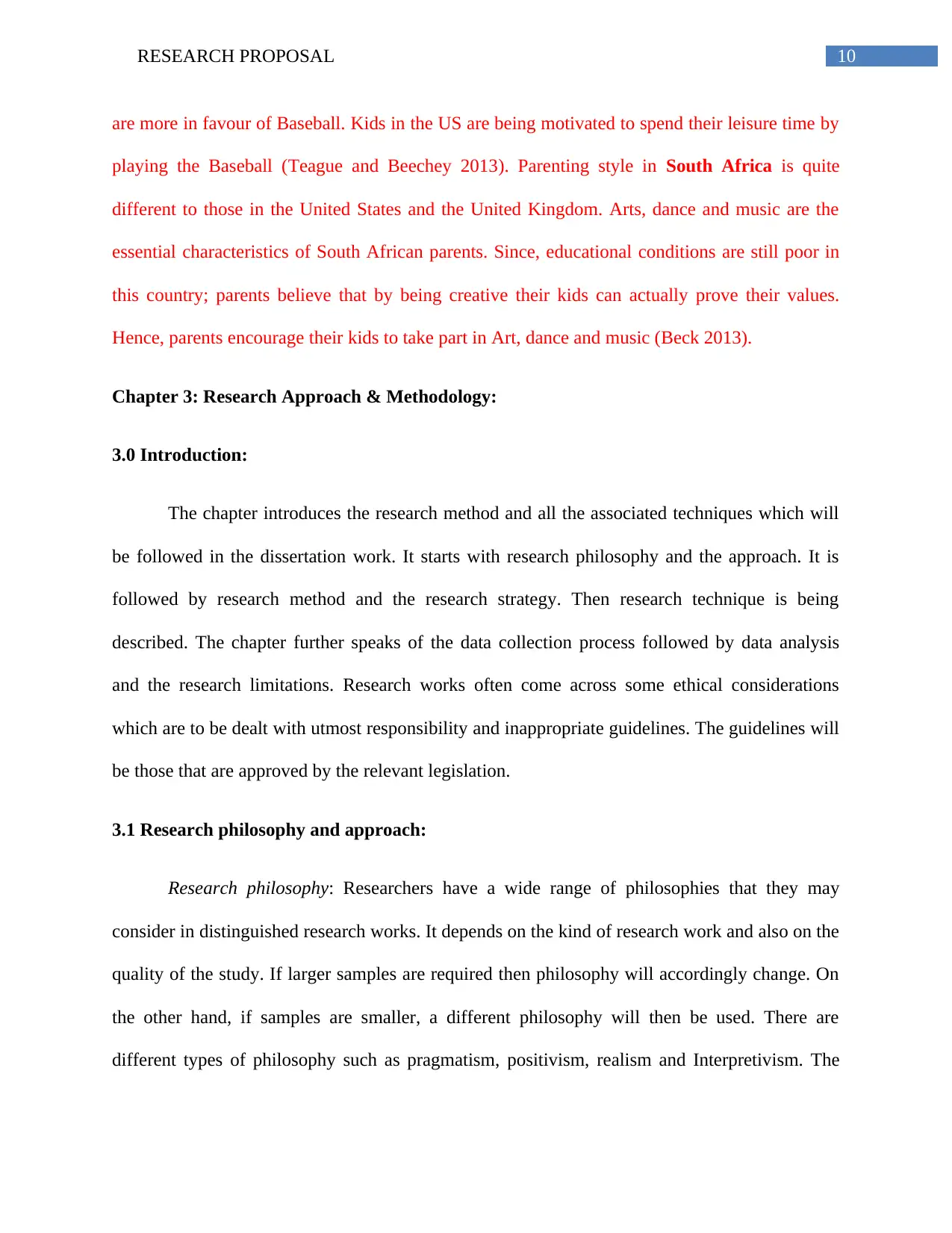
10RESEARCH PROPOSAL
are more in favour of Baseball. Kids in the US are being motivated to spend their leisure time by
playing the Baseball (Teague and Beechey 2013). Parenting style in South Africa is quite
different to those in the United States and the United Kingdom. Arts, dance and music are the
essential characteristics of South African parents. Since, educational conditions are still poor in
this country; parents believe that by being creative their kids can actually prove their values.
Hence, parents encourage their kids to take part in Art, dance and music (Beck 2013).
Chapter 3: Research Approach & Methodology:
3.0 Introduction:
The chapter introduces the research method and all the associated techniques which will
be followed in the dissertation work. It starts with research philosophy and the approach. It is
followed by research method and the research strategy. Then research technique is being
described. The chapter further speaks of the data collection process followed by data analysis
and the research limitations. Research works often come across some ethical considerations
which are to be dealt with utmost responsibility and inappropriate guidelines. The guidelines will
be those that are approved by the relevant legislation.
3.1 Research philosophy and approach:
Research philosophy: Researchers have a wide range of philosophies that they may
consider in distinguished research works. It depends on the kind of research work and also on the
quality of the study. If larger samples are required then philosophy will accordingly change. On
the other hand, if samples are smaller, a different philosophy will then be used. There are
different types of philosophy such as pragmatism, positivism, realism and Interpretivism. The
are more in favour of Baseball. Kids in the US are being motivated to spend their leisure time by
playing the Baseball (Teague and Beechey 2013). Parenting style in South Africa is quite
different to those in the United States and the United Kingdom. Arts, dance and music are the
essential characteristics of South African parents. Since, educational conditions are still poor in
this country; parents believe that by being creative their kids can actually prove their values.
Hence, parents encourage their kids to take part in Art, dance and music (Beck 2013).
Chapter 3: Research Approach & Methodology:
3.0 Introduction:
The chapter introduces the research method and all the associated techniques which will
be followed in the dissertation work. It starts with research philosophy and the approach. It is
followed by research method and the research strategy. Then research technique is being
described. The chapter further speaks of the data collection process followed by data analysis
and the research limitations. Research works often come across some ethical considerations
which are to be dealt with utmost responsibility and inappropriate guidelines. The guidelines will
be those that are approved by the relevant legislation.
3.1 Research philosophy and approach:
Research philosophy: Researchers have a wide range of philosophies that they may
consider in distinguished research works. It depends on the kind of research work and also on the
quality of the study. If larger samples are required then philosophy will accordingly change. On
the other hand, if samples are smaller, a different philosophy will then be used. There are
different types of philosophy such as pragmatism, positivism, realism and Interpretivism. The
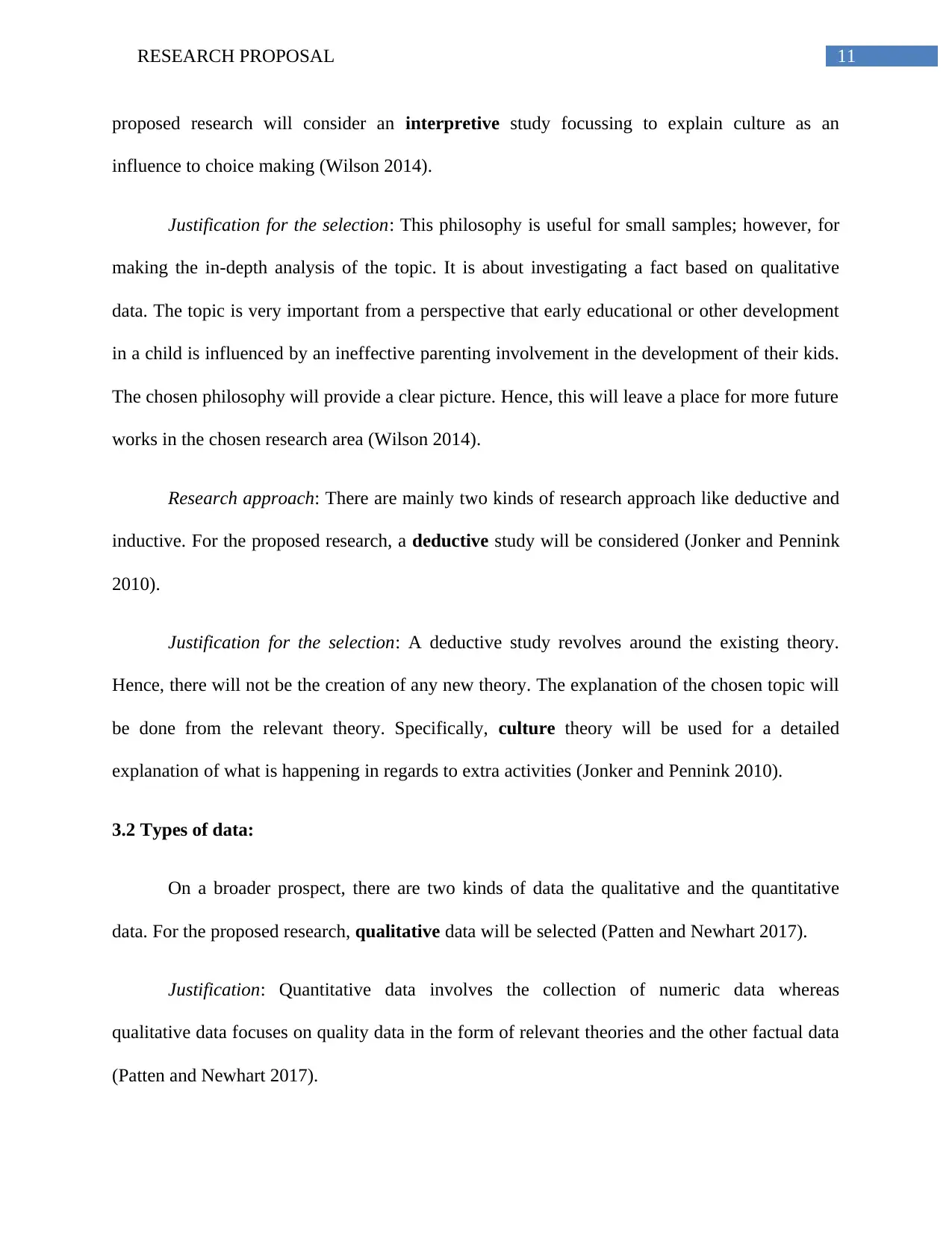
11RESEARCH PROPOSAL
proposed research will consider an interpretive study focussing to explain culture as an
influence to choice making (Wilson 2014).
Justification for the selection: This philosophy is useful for small samples; however, for
making the in-depth analysis of the topic. It is about investigating a fact based on qualitative
data. The topic is very important from a perspective that early educational or other development
in a child is influenced by an ineffective parenting involvement in the development of their kids.
The chosen philosophy will provide a clear picture. Hence, this will leave a place for more future
works in the chosen research area (Wilson 2014).
Research approach: There are mainly two kinds of research approach like deductive and
inductive. For the proposed research, a deductive study will be considered (Jonker and Pennink
2010).
Justification for the selection: A deductive study revolves around the existing theory.
Hence, there will not be the creation of any new theory. The explanation of the chosen topic will
be done from the relevant theory. Specifically, culture theory will be used for a detailed
explanation of what is happening in regards to extra activities (Jonker and Pennink 2010).
3.2 Types of data:
On a broader prospect, there are two kinds of data the qualitative and the quantitative
data. For the proposed research, qualitative data will be selected (Patten and Newhart 2017).
Justification: Quantitative data involves the collection of numeric data whereas
qualitative data focuses on quality data in the form of relevant theories and the other factual data
(Patten and Newhart 2017).
proposed research will consider an interpretive study focussing to explain culture as an
influence to choice making (Wilson 2014).
Justification for the selection: This philosophy is useful for small samples; however, for
making the in-depth analysis of the topic. It is about investigating a fact based on qualitative
data. The topic is very important from a perspective that early educational or other development
in a child is influenced by an ineffective parenting involvement in the development of their kids.
The chosen philosophy will provide a clear picture. Hence, this will leave a place for more future
works in the chosen research area (Wilson 2014).
Research approach: There are mainly two kinds of research approach like deductive and
inductive. For the proposed research, a deductive study will be considered (Jonker and Pennink
2010).
Justification for the selection: A deductive study revolves around the existing theory.
Hence, there will not be the creation of any new theory. The explanation of the chosen topic will
be done from the relevant theory. Specifically, culture theory will be used for a detailed
explanation of what is happening in regards to extra activities (Jonker and Pennink 2010).
3.2 Types of data:
On a broader prospect, there are two kinds of data the qualitative and the quantitative
data. For the proposed research, qualitative data will be selected (Patten and Newhart 2017).
Justification: Quantitative data involves the collection of numeric data whereas
qualitative data focuses on quality data in the form of relevant theories and the other factual data
(Patten and Newhart 2017).
⊘ This is a preview!⊘
Do you want full access?
Subscribe today to unlock all pages.

Trusted by 1+ million students worldwide
1 out of 19
Related Documents
Your All-in-One AI-Powered Toolkit for Academic Success.
+13062052269
info@desklib.com
Available 24*7 on WhatsApp / Email
![[object Object]](/_next/static/media/star-bottom.7253800d.svg)
Unlock your academic potential
Copyright © 2020–2026 A2Z Services. All Rights Reserved. Developed and managed by ZUCOL.





